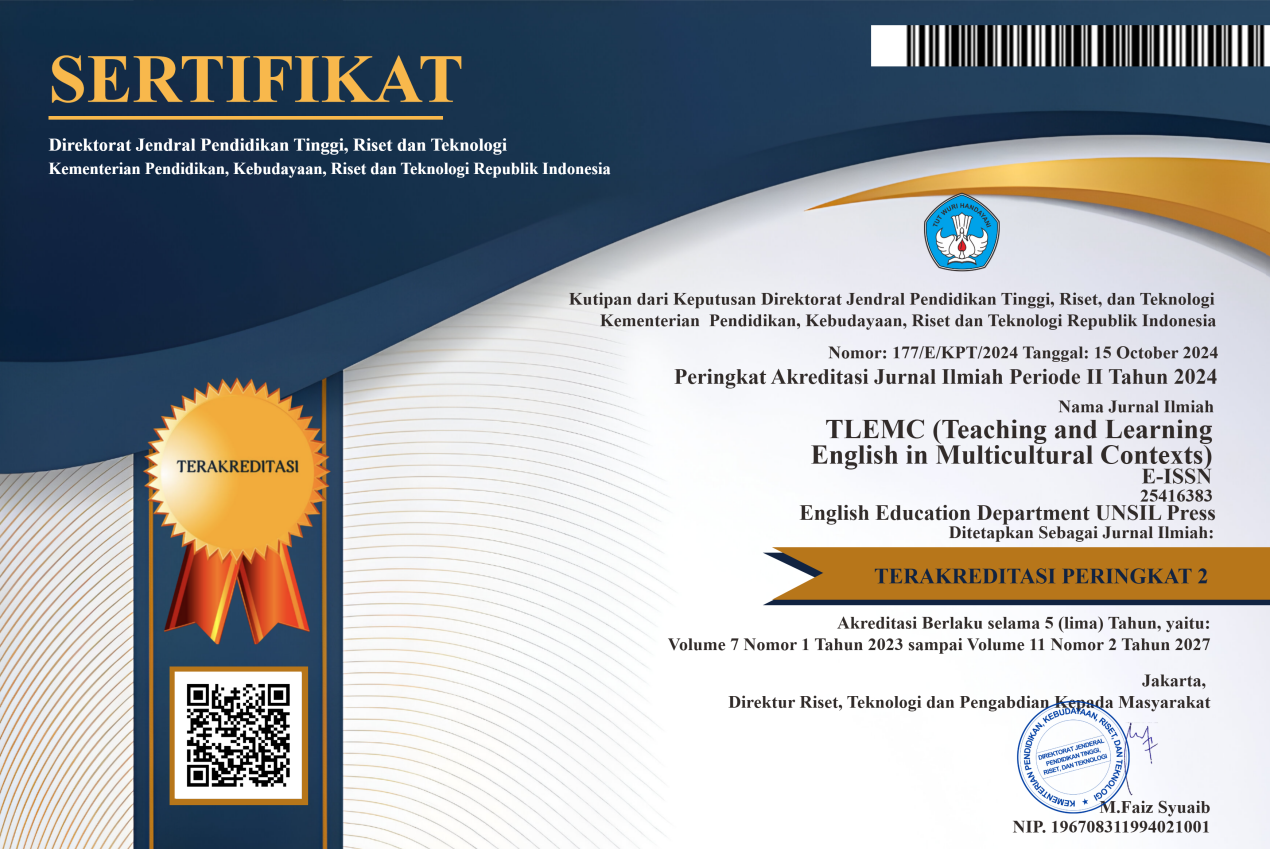Exploring Narrative Accounts of Indonesian Academic Returnee: Expectation vs Reality
Abstract
Academic returnees have become a trending issue recently. One issue concerns the reported challenges when they returned to their home country and re-integrated into their academic environment. This research aims to better understand the Indonesian academic returnee returning to the Indonesian academic sphere, particularly the returnee who teaches English in higher education. This study is grounded under narrative inquiry. Narrative interviews with four English lecturers, three women, and a man, were used to unpack their challenging experiences. The present research shows two types of challenges faced by Indonesian academic returnees, academic and social culture. Concerning academic culture, the returnee often experienced different conceptions of the current English language teaching methods. Social culture is closely related to their inconvenience of being on-time and disciplined persons. This research is expected to provide more nuanced about the challenges of academic returnees re-integrating into the academic milieu.
Â
Keywords: narrative accounts, Indonesian academic returnee, reverse culture shock
Full Text:
PDFReferences
Ai, B. (2019). Pains and gains of working in Chinese universities: an academic returnee’s journey. Higher Education Research and Development, 38(4), 661–673.
https://doi.org/10.1080/07294360.2019.1590320
Ai, B., & Wang, L. (2017). Homeland integration: An academic returnee’s experiences in Chinese universities. International Journal of Qualitative Methods, 16(1). https://doi.org/10.1177/1609406917696741
Alkubaidi, M., & Alzhrani, N. (2020). “We Are Backâ€: Reverse Culture Shock Among Saudi Scholars After Doctoral Study Abroad. SAGE Open, 10(4). https://doi.org/10.1177/2158244020970555
Belhadi, F., & Ayad, S. (2017). Culture Shock Among International Students: A Case Study at The University of Tlemcen. http://dspace.univ-tlemcen.dz/handle/112/11008
Cebolla-Boado, H., Hu, Y., Soysal, Y. M. (2017). Why study abroad? Sorting of Chinese students across British universities. British Journal of Sociology of Education. http://dx.doi.org/10.1080/01425692.2017.1349649
Click, A. B. (2016). Adapting to Higher Education in A New Culture: International Students' Perspective on Research, Writing and Academic Integrity. Information and Library Science.
Colorado State University. (2020). Narrative Inquiry. Retrieved from https://writing.colostate.edu/guides/page.cfm?pageid=1346&guideid=63
Connelly, F. M., & Clandinin, D. J. (1990). Stories of Experience and Narrative Inquiry. Educational researcher, 19(5), 2. doi:10.2307/1176100
Conway, D., Potter, R. B., & Bernard, G. S. (2012). Diaspora return of transnational migrants to Trinidad and Tobago: The additional contributions of social remittances. International Development Planning Review, 34(2), 189–209. https://doi.org/10.3828/idpr.2012.12
Creswell, J. W., Hanson, W. E., Clark Plano, V. L., & Morales, A. (2007). Qualitative Research Designs: Selection and Implementation. The Counseling Psychologist, 35(2), 236–264. https://doi.org/10.1177/0011000006287390
Fangmeng, T. (2018). Globalization and Transnational Academic Mobility: The Experiences of Chinese Academic Returnees by Qiongqiong Chen; Return Migration Decisions: A Study on Highly Skilled Chinese in Japan by Ruth Achenbach. Asian and Pacific Migration Journal, 27(2), 242–245. https://doi.org/10.1177/0117196818769495
Foster, M. (2014). Student destination choices in higher education: Exploring attitudes of Brazilian students to study in the United Kingdom. Journal of Research in International Education, 13(2), 149–162. https://doi.org/10.1177/1475240914541024
Green, W., Gannaway, D., Sheppard, K., Jamarani, M. (2015). What’s in their baggage? The cultural and social capital Australian students preparing to study abroad. Higher Education Research & Development. 34(3), 513-526. http://dx.doi.org/10.1080/07294360.2014.973381
Haines, D. (2013). “More Aware of Everythingâ€: Exploring the Returnee Experience in American Higher Education. Journal of Studies in International Education, 17(1), 19–38. https://doi.org/10.1177/1028315311433207
Hao, J., Wen, W., & Welch, A. (2016). When sojourners return: Employment opportunities and challenges facing high-skilled Chinese returnees. Asian and Pacific Migration Journal, 25(1), 22–40. https://doi.org/10.1177/0117196815621806
Hoang, H. T., & Ho, N. T. T. (2019). Antecedents of work readjustment of professional returnees: evidence from Vietnam. Asia-Pacific Journal of Business Administration, 12(1), 58–72. https://doi.org/10.1108/APJBA-05-2019-0118
Josselson, R. (2007). The Ethical Attitude in Narrative Research: Principles and Practicalities. In D. J. Clandinin (Ed.), Handbook of narrative inquiry: Mapping a methodology (p.537–566). Sage Publications, Inc. https://doi.org/10.4135/9781452226552.n21
Karakaş, A. (2020). Disciplining transnationality? The impact of study abroad educational experiences on Turkish returnee scholars’ lives, careers and identity. Research in Comparative and International Education. https://doi.org/10.1177/1745499920946223
Kolber, S., & Rice, S. M. (2019). Teachers ’ career intentions , school facilities and resources . January, 1–84.
Lei, L. (2020). Returning "home"? Exploring the reintegration experiences of internationally educated Chinese academic returnees. Emerging Perspectives, 4(1), 13-18.
Li, F., Ding, J., & Shen, W. (2019). Back on track: Factors influencing Chinese returnee scholar performance in the reintegration process. Science and Public Policy, 46(2), 184–197. https://doi.org/10.1093/scipol/scy047
Ma, Y., & Pan, S. (2015). Chinese returnees from overseas study: An understanding of brain gain and brain circulation in the age of globalization. Frontiers of Education in China, 10(2), 306–329. https://doi.org/10.3868/s110-004-015-0019-6
Moon, S. (2011). Expectation and reality: Korean sojourner families in the UK. Language and Education, 25(2), 163–176. https://doi.org/10.1080/09500782.2011.554986
Ono, K. (2018). The Reintegration of Kikokushijo: Reflections on Culture and Identity. The Japan Association Language Teaching Journals, 38(1-2),316 – 342. https://jalt.org/events/matsuyama-chapter/18-05-20
Rifai, I., & Tamrin, M. (2020). an Autoethnographic Account of Two Indonesian Academic Returnees Experienced of Reverse Culture Shock. Journal Sampurasun : Interdisciplinary Studies for Cultural Heritage, 6(2), 59–66. https://doi.org/10.23969/sampurasun.v6i2.3317
Sánchez, C. M., Fornerino, M., & Zhang, M. (2006). Motivations and the intent to study abroad among U.S., French, and Chinese students. Journal of Teaching in International Business, 18(1), 27–52. https://doi.org/10.1300/J066v18n01_03
Singh, A. K., & Singh, M. (2014). Role of Infrastructure in Teacher Retention : a Case Study of. International Journal of Organizational Behaviour & Management Perspectives © Pezzottaite Journals., 3(February 2016), 791–794.
Szkudlarek, B. (2010). Reentry-A review of the literature. International Journal of Intercultural Relations, 34(1), 1–21. https://doi.org/10.1016/j.ijintrel.2009.06.006
Xu, D. (2009). Opportunities and challenges for academic returnees in China. Asia Pacific Journal of Management, 26(1), 27–35. https://doi.org/10.1007/s10490-007-9075-y
Zhou, Y; Jindal-Snape, D; Topping, K; & Todman, J. (2008). Theoretical models of culture shock and adaptation in international students in higher education. Studies in Higher Education, 33 (1), 63-75. http://dx.doi.org/10.1080/03075070701794833
DOI: https://doi.org/10.37058/tlemc.v5i0.3772
Refbacks
- There are currently no refbacks.
INDEXED BY:
This work is licensed under a Creative Commons Attribution-NonCommercial-ShareAlike 4.0 International License.
![]()
TLEMC (Teaching and Learning English in Multicultural Contexts)
Program Studi Pendidikan Bahasa Inggris
Fakultas Keguruan dan Ilmu Pendidikan
Universitas Siliwangi
Jl. Siliwangi No. 24 Kota Tasikmalaya - 46115
email: tlemc@unsil.ac.id





